Life's Journey – Exploring Relationships, Resolving Conflicts. A Review
Category: Literature Issue No. 164
By Dr. Batya L. Ludman
368 pages. Devora Publishing. 2011. NIS 90.
Available: Raanana: Hagut Judaica, Borochov St.; Wiz Kids,Hapalmach St., Steimatsky; Jerusalem: Pomerantz. Also from Amazon.
When my husband first volunteered me to review Batya Ludman's book Life's Journey – Exploring Relationships, Resolving Conflicts, I was a little unsettled. "After all", I asked myself, "how objective can I be if I review a book written by a very good friend of mine? And worse still, what if I don't like her book?" But as I ventured into it, my fears were allayed. This is because Life's Journey is written in very straightforward language, with the author discussing the challenges that people face in life, sensitively, while providing insights and sensible solutions. This book is a road map for people to live more fulfilling, satisfying lives, while bringing them closer to the people they care about.
I couldn't just kick back and relax though when reading Batya's book. She asks questions and rouses readers to look at their own life situations. It's not always easy to peer closely at oneself and the possible disharmony within one's own household. But if readers can be honest with themselves and recognize that they have problems, then they can benefit from Batya's well thought-out resolutions.
I interviewed Batya to find out more about her background and her book.
Batya agreed that each article contains “homework”.
"It is there if you want to do it, and if not, you'll get something out of the chapter anyway", she says. "In life we are constantly dealing with 'mini-losses' – whether the loss of a job, a connection with someone we were close to or a move. We have to learn how to deal with losses. The goal is to look at life's curve balls as challenges to be faced, rather than as obstacles in our paths".
I sat with Batya in her living room, surrounded by paintings of a lighthouse, a fisherman's cove and an old farmstead, which recalled her early days of growing up in Canada's maritime province of Nova Scotia. The tiny town of Yarmouth where she lived with her parents, two older brothers and younger sister, had about 9000 people, and theirs was one of only 50 to 60 Jewish households. Nonetheless, Batya held a very strong sense of her Jewishness. It was not challenged even when going to a public school and sometimes being instructed by nuns.
Everyone in town knew Batya's father, Lester Pink, who designed and manufactured sweaters. Later, Mr. Pink decided to start his own newspaper and became a very successful publisher. His Yarmouth County Vanguard is still in print today.
Batya inherited her father's high energy level and gift for writing, and as a little girl she dreamed of becoming a doctor. At university in Halifax, however, Batya shifted gears and studied psychology. She has often worked in a medical environment and to this day retains a strong interest in the connection between patients’ physical condition and their emotional state.
At university Batya met her future husband, Mark Ludman. After marrying in 1979, they moved to Mark's native New York City for ten years. In this time, Batya completed her doctoral degree at Yeshiva University, did post-doctoral work in sex therapy, was on the faculty of Mount Sinai School of Medicine, and gave birth to their first child.
The Ludmans then returned to Canada and two more children followed. But even in her tranquil home province of Nova Scotia, Batya faced occasional anti-Semitism. She and Mark couldn't help but feel that Israel was the country in which their family's Judaism could be most fully expressed and felt. So in 1999 the Ludman family made aliyah and settled in Raanana.
A year after they moved to Israel, the Second Intifada started. There didn't seem to be anyone writing about its effects on children, so Batya submitted a column on this subject to The Jerusalem Post. It was very well received. She wrote on numerous other life situations after this, and her bi-weekly submissions evolved into the column “Psychologically Speaking”. Her enthusiastic readers encouraged her to put these columns into a book.
Says Batya, "As a newspaper publisher my father would have loved it had my articles in The Jerusalem Post been syndicated. I feel that Life's Journey is a tribute to him."
Through this book, her columns will now be more widely read and her father's wish indirectly fulfilled.
After 30 years of working as a clinical psychologist, Batya has a deep well of human experience to draw from. Sometimes employing case studies, she gives compassionate advice on such issues as internet addiction, post-partum blues, relationships with the in-laws, and coping with cancer.
In the section “Parenting Joys and Struggles – What's It All About?”, for instance, Batya offers many positive suggestions on how to build a child's esteem. In “How Healthy is Your Family?” she makes us closely examine if we are doing the best we can to build a healthy family unit, and if not, what we can do to change this.
These are just a few of more than 60 topics in her book. "Some topics may not be relevant for you now, but will be later – for example, the chapter on retirement,” she says.
She is not hesitant to share from her own life. In “And Baby Makes Three”, she is very forthcoming when she admits to her own difficulties in being a first- time mom. Her openness can be very reassuring to readers when they note that even competent professionals can find parenting to be overwhelming at times.
I particularly liked “Time to Recharge” with its advice to set aside a couple of days to do what you really want to do; and was touched by the soul-baring “A Letter from a Teenage Daughter”. This chapter reveals the convoluted spectrum of a teenage girl's attitudes and moods. One can't help but feel for teenagers going through a difficult stage, and the mothers who sometimes feel like pulling out their own hair when dealing with them.
I chuckled when I read the chapter "Aliyah: Living Here when Things Drive You Crazy”. She conveys with humor both the challenges and the joys of trying to make it in the Holy Land.
Batya doesn't shy away from the subject of death, either, but instead addresses it head-on, beginning with her motivation to volunteer for the Chevra Kadisha, the holy burial society in Halifax, Nova Scotia. In the section “Life – Death Passages”, Batya writes about how much she has learned from people who have died – to give love while we can, to appreciate what we have and not to waste our energy on things that are not important. Life is short.
Reading Batya's book was an excellent use of my time. It made me ache for the pain of the human condition and the messes that we sometimes get ourselves into, but at the same time it helped me see that with intellect and goodwill, we can overcome many problems. I came away more knowledgeable and uplifted for having read her book, and you will too. Life's Journey has something in it for everyone.
 That Certain Smile
That Certain Smile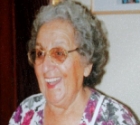 Fay Shelter 1919-2012
Fay Shelter 1919-2012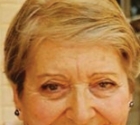 Doreen (Devorah) Goldberg 1924 – 2012
Doreen (Devorah) Goldberg 1924 – 2012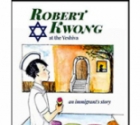 Robert Kwong at the Yeshiva
Robert Kwong at the Yeshiva 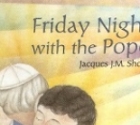 Friday Night with the Pope - A Book Review
Friday Night with the Pope - A Book Review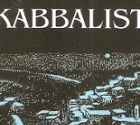 The Kabbalist - A Book Review
The Kabbalist - A Book Review 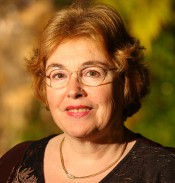 HEDDI KEIL
HEDDI KEIL